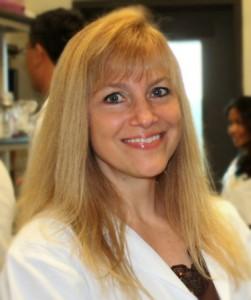Welcome from our Division Head

Division Head and Professor of Pharmacology & Toxicology
Thank you for visiting the website of the Division of Pharmacology and Toxicology at the University of Texas at Austin! As the Pharmacology and Toxicology Division Head, it is my privilege to introduce you to our program.
The University of Texas Pharmacology and Toxicology/Pharmaceutical Sciences PhD program is among the top in the country, with 16 faculty and 29 graduate students. With an emphasis in environmental and molecular mechanisms of health and disease, we aim to identify the mechanisms involved in disease etiology to apply this knowledge to develop improved strategies to prevent and/or treat human disorders. Our focus is on neurological and developmental disorders, addiction, and cancer. Our outstanding faculty have won multiple prestigious awards for their research in the areas of DNA damage and repair, cancer etiology and prevention, addiction and neurotoxicity, neuroimmunology, and neuroendocrinology, and generate ~$8,000,000 per year in grant funding to support research. Our students receive a competitive stipend with paid tuition and health insurance, and they customize their coursework according to their research interests.
We are proud to be an inclusive and diverse community located in the heart of Austin (ranked #1 most livable city in the country). Fellowships and professional development opportunities are available along with financial support for travel to conferences. The mission of the Division of Pharmacology and Toxicology is to train the next generation of scientists through excellence in research, education, and service. Our research interests span both fundamental and translational mechanisms of drug action, neuropharmacology of addiction, DNA repair and genetic instability, cancer biology, and environmental factors that contribute to disease. We share a common vision of applying new discoveries to the development of improved strategies to prevent and/or treat human disorders.
What starts here changes the world!

Support the Division of Pharmacology and Toxicology
The UT College of Pharmacy can most effectively achieve its mission of providing an exemplary pharmacy education with financial support from alumni and friends. Gifts to the college are critical to ensuring we continue to provide an outstanding pharmacy education to produce exceptional pharmacists, researchers, educators and leaders in the industry.
Gifts at any level are appreciated, but we also encourage donors to consider Leadership Circle membership, which requires a minimum annual gift of $2,000; many donors schedule withdrawals over 12 months totaling this amount via the online gift system. The Pharmacology and Toxicology Unrestricted Fund is the priority for Leadership Circle gifts. See the Philanthropic Investment Opportunities link below for additional gift options.
Office Contact Information
Mailing Address:
Pharmacology & Toxicology
College of Pharmacy, The University of Texas at Austin
107 W. Dean Keeton Stop C0875
BME 3.510
Austin, TX, USA 78712
Email: pharmtox@austin.utexas.edu
Phone: +1 512-471-5158

